Omicron Covid variant: What we know about new virus strain
New details have shed light on where the new Covid variant Omicron was first discovered. Here’s what we know so far.
World
Don't miss out on the headlines from World. Followed categories will be added to My News.
The new Covid variant Omicron has caused Australia to reimpose quarantine rules and slam the borders shut to several southern African countries.
Here’s what we know about the concerning new variant so far.
WHERE DID OMICRON ORIGINATE?
Originally the Omicron variant was thought to have originated in Botswana, but new evidence suggests it was spreading in Europe before the alarm was raised about the variant on November 24. Botswanan officials say their early cases were imported by diplomats.
A South African doctor raised the alarm about the new variant on November 24, however health officials in The Netherlands who checked back through recent test results have found cases in that country a week before it emerged in South Africa.
Test samples show it was in the Netherlands on November 19 while in Scotland there were infections with Omicron from November 20.
HOW WAS THE NEW VARIANT DISCOVERED?
Dr Angelique Coetzee, chair of the South African Medical Association, first raised the alarm.
She told the BBC that she started to see patients around November 18 presenting with “unusual symptoms” that differed slightly from those associated with the Delta variant.
“It actually started with a male patient who’s around the age of 33 ... and he said to me that he’s just (been) extremely tired for the past few days and he’s got these body aches and pains with a bit of a headache,” she told the BBC.
The patient didn’t have a sore throat, she said, but more of a “scratchy throat”. He had no cough or loss of taste or smell — symptoms that have been associated with previous strains of the coronavirus.
After seeing more patients that day with the same symptoms, Dr Coetzee contacted South Africa’s vaccine advisory committee.
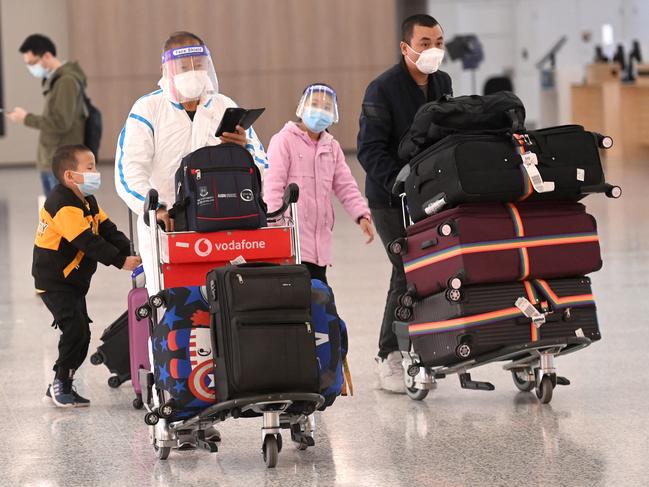
HOW MANY CASES DOES AUSTRALIA HAVE?
There are five confirmed cases of the Omicron variant in Australia, with four cases in NSW and one in the Northern Territory.
The latest NSW case, a traveller in her 30s from southern Africa, visited shops across Sydney before isolating in the Central Coast. She had travelled to at least two southern African countries prior to arriving in Australia.
The woman, who is fully vaccinated, arrived in Sydney on flight QR908 from Doha and travelled by private car to the Central Coast.
In the NT, a man in his 30s who arrived on a repatriation flight from Johannesburg tested positive to the Omicron strain.
The man has been in quarantine at the Howard Springs quarantine facility since arriving from South Africa on November 25.
WHAT ABOUT GLOBAL SPREAD?
Three new Omicron cases have been confirmed in Scotland, Sky News reported on Tuesday, taking the total number of cases in Britain to 14.
Japan and France have reported their first cases of the variant as well as Austria.
Portugal detected 13 cases of the Omicron variant, all involving players and staff members of Lisbon soccer club Belenenses SAD after one player recently returned from South Africa.
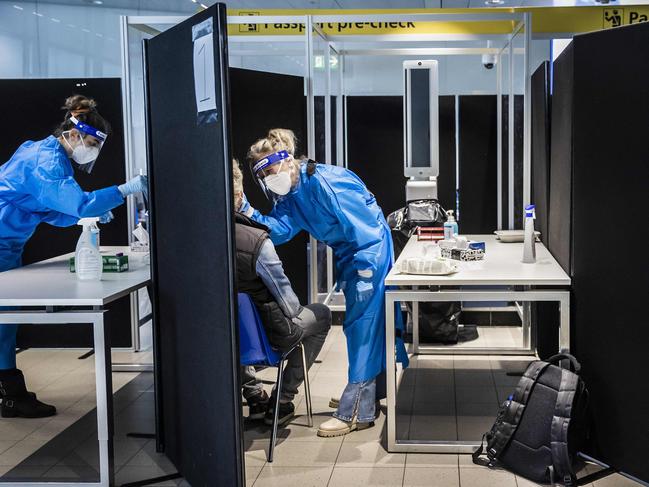
In Germany, two cases were detected in the southern state of Bavaria while in Milan a case of the variant was detected in a person coming from Mozambique.
Denmark has registered a total of four cases of the Omicron variant, its infectious disease authority said on Tuesday, adding that all of them were connected to “travel activity” in South Africa.
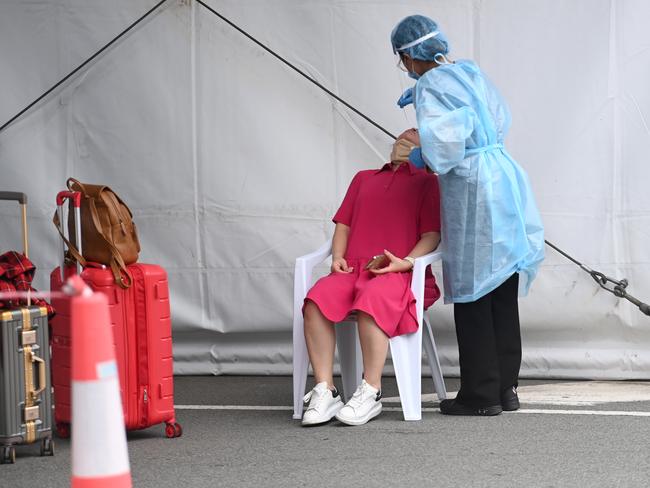
WHAT IS THE DANGEROUS NEW STRAIN MADE UP OF?
The new Covid variant Omicron has scientists worried because it has twice the mutations of the Delta variant that has caused havoc around the world.
Omicron has 32 mutations in the spike protein, the part of the virus that most vaccines use to prime the immune system against Covid.
DOES IT MAKE YOU SICKER?
There is no evidence that the variant will cause a more severe illness. The World Health Organisation (WHO) said there was “preliminary evidence” to suggest an increased risk of reinfection with Omicron for those who have already had the virus as compared to other variants. No unusual symptoms have been reported with this variant, which can also lead to asymptomatic cases, according to South Africa’s National Institute for Communicable Diseases.
Chief Medical Officer Paul Kelly said on Monday some reports out of South Africa were that it was mostly mild. “Other information we have is that hospitalisation rates are increasing. So, we need to get further information there, and we are getting that information,” Dr Kelly said.
South Africa has a younger population than Australia, a different health system and very high HIV rates, which can affect how any viruses transmitted and its severity, Professor Kelly said.
The two vaccinated travellers who tested positive for Omicron after entering Australia were asymptomatic as were the two fully vaccinated young people found with the virus in Hong Kong.
WHAT DOES IT MEAN FOR INTERNATIONAL TRAVELLERS ENTERING AUSTRALIA AND STATE BORDERS?
Australia has suspended flights from South Africa, Namibia, Zimbabwe, Botswana, Lesotho, Eswatini, the Seychelles, Malawi, and Mozambique for 14 days.
Non-Australians who have been in those countries in the past two weeks are now banned from entering Australia.
Australians who have been in those nine African countries have to quarantine for 14 days.
Returned Australians who entered Australia before the new rules took effect also have to quarantine from 14 days after their departure from the southern African area.
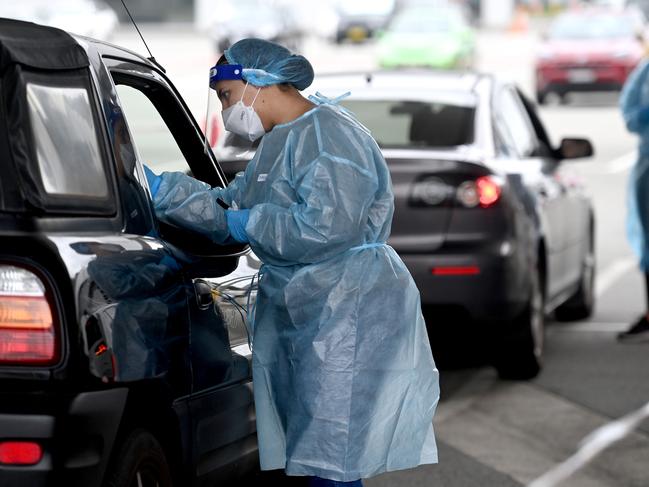
Additionally, in NSW and Victoria all travellers who have been in any overseas country during the 14 day period before their arrival in Australia must isolate for 72 hours.
In Victoria any close contacts of a confirmed and suspected Omicron case will have to isolate for 14 days, regardless of their vaccination status.
When asked if states should be shutting their borders to each other, Health Minister Greg Hunt said he had “not received any advice to that effect”.
WHAT ABOUT INTERNATIONAL TRAVEL?
Israel became the first country to ban international travellers from all countries as a result of the new variant.
Japan has closed its borders to foreign visitors.
The UK reimposed tight rules on mask-wearing and testing of international arrivals after confirming the first cases of the new strain. British PM Boris Johnson said anyone arriving in England will be asked to take a mandatory PCR test for Covid-19 on the second day after their arrival and must self isolate until they provide a negative test.
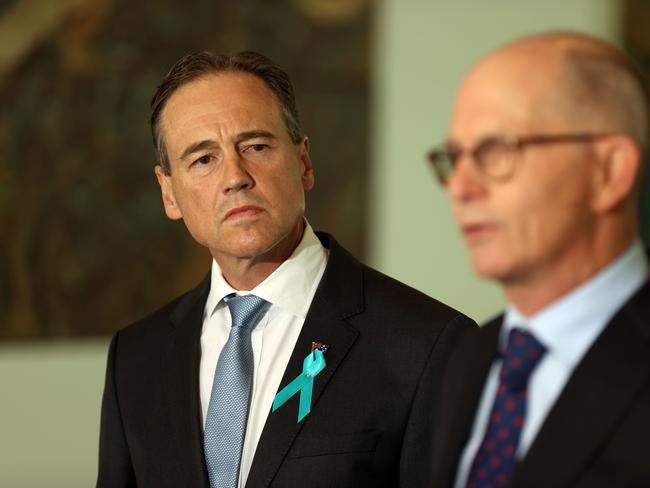
WHY ARE EXPERTS SO WORRIED?
Newcastle University Immunologist Professor Nathan Bartlett said the mutations to the spike protein were likely to enhance the ability of the virus to enter our body making it more transmissible.
Monash University Virologist Dr Vinod Balasubramaniam said most of the major mutations were located at the exact location on the spike protein where antibodies from vaccines are targeted, “in other words making it problematic for the immune response induced by the vaccines”. These mutations can make the spike protein less recognisable to our antibodies. As a result, they would not be as effective at neutralising the virus, which is then able to slip past immune defences and cause infection, he said.
WHAT ARE THE RISKS OF CATCHING THE VARIANT?
Professor Paul Kelly said: “The information from South Africa is that it has replaced Delta as the major, possibly the only, virus circulating in that country, quite quickly. So, it is transmitting, at least as well as Delta. That seems clear.”
The World Health Organisation said it was not yet clear whether Omicron was more transmissible. University NSW infectious diseases expert Professor Raina MacIntyre said the nature of the mutations could make the variant more infectious but there was not enough data at this stage to draw any conclusions. Most Australian experts said we should impose restrictions on international travellers while we worked to understand the new variant.
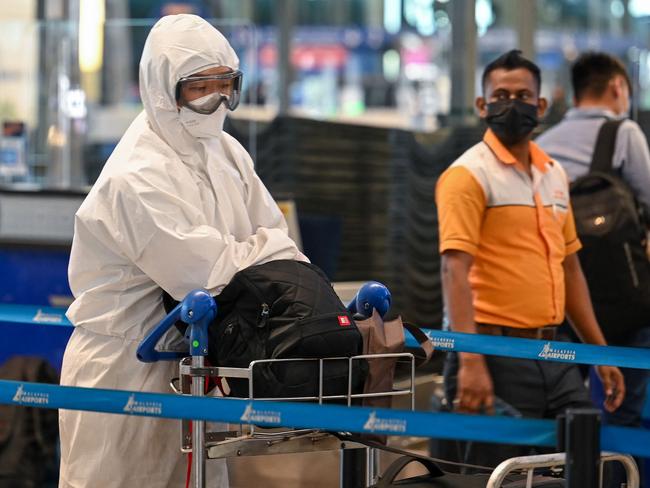
WILL VACCINES PROTECT AGAINST OMRICON?
There are concerns that vaccines may not provide extensive protection from Omicron. We know the two travellers who tested positive for Omicron after entering NSW were fully vaccinated but they were asymptomatic. The two young travellers who tested positive in Hong Kong were also fully vaccinated but asymptomatic.
“At the moment, we have no definite evidence, either clinical or laboratory or at the population level, that the vaccines are less effective against this virus,” Professor Kelly said.
Deakin University epidemiologist Professor Catherine Bennett said it was not yet known how effective current vaccines are against Omicron as vaccination rates are low in South Africa, with only 24 per cent fully vaccinated. “They have just come out of a large Delta wave yet are reporting worrying rates of reinfection. There are also high rates of people living with HIV and AIDS in southern Africa which makes it more complicated to interpret the effectiveness of either vaccine-induced or natural immunity against infection or serious illness,” Professor Bennett said.
WHEN WILL WE KNOW IF VACCINES WORK AGAINST OMICRON?
Australian researchers are already growing samples of the new variant they can test in the lab. Antibodies drawn from the blood of people infected with Covid and from those vaccinated against it will be mixed in a laboratory dish with samples of Omicron to see whether they control the virus. Kirby Institute’s Associate Professor Stuart Turville has invented a high speed process that can rapidly grow virus cells overnight for testing. Within a week he should be able to determine how effective existing vaccines are against the new variant. These tests will then have to be performed multiple times to check the accuracy of results and this process could take a few weeks.
SHOULD WE BRING FORWARD BOOSTER DOSES OF VACCINES?
Currently you have to wait for six months after your second Covid jab before you are eligible for a booster dose.
Health Minister Greg Hunt has asked the nation’s vaccine advisory committee to provide advice on whether booster doses should be brought forward to deal with Omicron.
Experts are divided. ANU’s Professor Peter Collignon said we should wait for more data and he said evidence showed vaccines worked more effectively when there was a larger gap between doses.
However, Professor Raina MacIntyre, the Kirby Institute’s Dr Deborah Cromer and the OzSage group of experts are urging booster doses to be brought forward from six to two months after the second dose.
“Waning immunity after dose 2 starts 2-3 months after the second dose – the booster can be given any time from 2-6 months after the second dose, and we should be encouraging rapid, high 3rd dose uptake,” Professor MacIntytre said.
Dr Cromer said: “Booster shots increase immunity against the virus”.
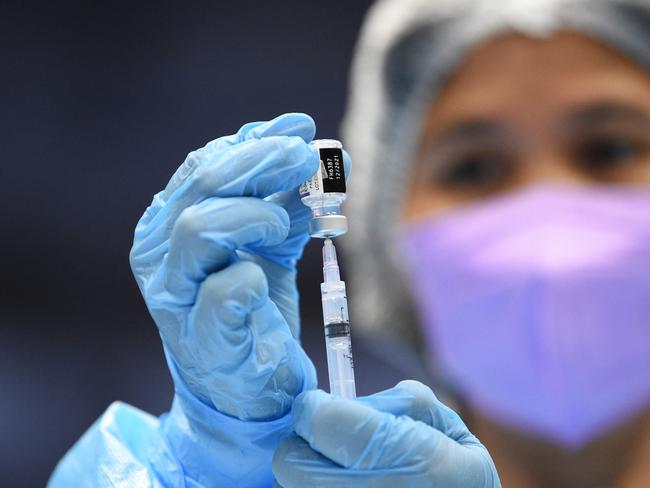
ARE VACCINE MANUFACTURERS WORKING ON NEW VACCINES AGAINST OMICRON?
Pfizer is testing its existing vaccine against Omicron and announced it could produce a new vaccine tailored to the emerging variant in approximately 100 days.
Moderna said it had already begun testing booster doses of its vaccine against some of the variants in Omicron and was working to make an Omicron-specific vaccine which would be ready for clinical testing within 60-90 days.
Novavax announced last week it was already working to update its vaccine against Omicron.
The scientists who lead the research behind the AstraZeneca jab said a new vaccine against Omicron could be developed very rapidly.
Mr Hunt said Australia’s existing vaccine contracts had already prepared for covering new variant-specific jabs.
“If there were a requirement for a change, that they are ready and we are ready,” he said.
WILL TREATMENTS FOR COVID WORK AGAINST OMRICON?
Pharmaceutical companies that supplies the Covid treatment sotrovimab report that they designed the antibody for exactly this purpose.
“So it would cover more than what was circulating at the time” Professor Kelly said.
WHAT IS THE WHO RESPONSE?
The WHO said the mutations were concerning and it classified it as a “variant of concern” last week.
“Preliminary evidence suggests an increased risk of reinfection with this variant, as compared to other (variants of concern),” the WHO said.
“It is not yet clear whether infection with Omicron causes more severe disease compared to infections with other variants, including Delta.
“Preliminary data suggests that there are increasing rates of hospitalisation in South Africa, but this may be due to increasing overall numbers of people becoming infected, rather than a result of specific infection with Omicron. There is currently no information to suggest that symptoms associated with Omicron are different from those from other variants.”
More Coverage
Originally published as Omicron Covid variant: What we know about new virus strain




